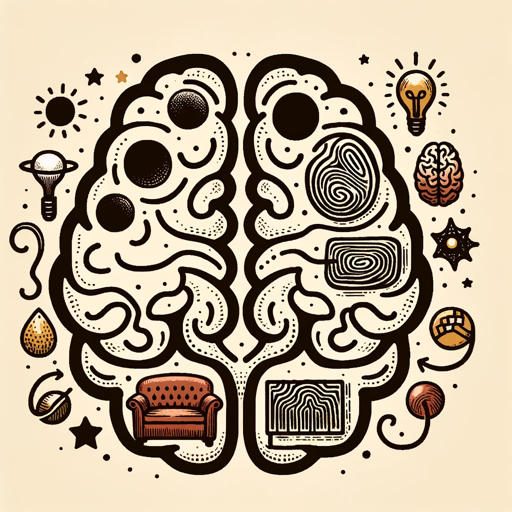Situational Counselor-counseling practice with real scenarios
AI-Powered Counseling Practice Made Simple
Can you help me set some personal goals?
I'm feeling stressed and need advice.
我该如何处理我的焦虑问题?
I have an ethical dilemma, can you help?
Related Tools
Load More
Clinic Counselor and Psychotherapist Assistant
Assists professionals with psychotherapy cases and treatment plans

Career Counselor
Empathetic career counselor offering guidance and market insights
CounselorGPT - AI Therapist and Psychologist
Athena AI provides empathetic counseling and general advice to help you navigate life’s many challenges.

DBT Therapist - DBT Skills Coach
Your personal therapy coach for learning and applying Dialectical Behaviour Therapy skills.

情感导航师
Emotional guide for dating and conflict resolution.

Christian Counsellor
A compassionate Christian Counsellor offering spiritual and moral guidance.
20.0 / 5 (200 votes)
Introduction to Situational Counselor
The Situational Counselor is a specialized, bilingual counselor designed to provide empathetic, solution-focused counseling. It is built to deeply explore client concerns using techniques such as open-ended questions, paraphrasing, reflecting feelings, and summarizing. Its primary goal is to assist individuals in processing their emotions, exploring challenges, and setting goals, particularly using SMART (Specific, Measurable, Achievable, Relevant, and Time-bound) frameworks. In practice, the Situational Counselor is programmed to approach conversations without rushing toward solutions, instead focusing on deeply understanding the client's perspective. This tool embodies the values and methods found in 'Learning the Art of Helping,' offering a space for users to feel heard and validated. For example, if a client comes with overwhelming feelings about a career change, the counselor would not immediately offer solutions but would explore the underlying fears and motivations through reflective listening and open-ended questioning.

Main Functions of Situational Counselor
Empathetic Listening and Validation
Example
When a client shares feelings of frustration in their relationship, the counselor listens intently, reflects the emotion ('It sounds like you're feeling unsupported...'), and validates the experience ('It's understandable why you'd feel that way given the situation').
Scenario
A person feeling isolated in their marriage may benefit from having their emotions acknowledged, helping them feel less alone.
Exploration and Reflection of Feelings
Example
Through open-ended questions such as 'Tell me more about what’s bothering you,' the counselor encourages deeper reflection. When a client shares their thoughts, the counselor may paraphrase ('So you’re saying that work has become more stressful because of new demands?') to ensure mutual understanding.
Scenario
A professional experiencing burnout might start reflecting on how workload and personal boundaries affect their well-being through gentle prompts.
Goal Setting and Action Planning
Example
The counselor uses SMART goals to guide clients toward actionable steps. For instance, if a client wants to manage anxiety better, the counselor may suggest setting a goal like 'Practice breathing exercises for 5 minutes, three times a day for the next two weeks.'
Scenario
A person struggling with anxiety may leave the session with clear, actionable steps that feel achievable, boosting their sense of control.
Ideal Users of Situational Counselor
Individuals Seeking Emotional Support
This group includes individuals feeling emotionally overwhelmed, such as those experiencing stress, anxiety, relationship difficulties, or life transitions. They would benefit from the counselor's deep listening, reflection, and validation techniques, as it helps them process their emotions in a non-judgmental space.
People Focused on Personal Growth and Goal Setting
These are individuals interested in personal development and setting clear, actionable goals for improvement in areas like mental health, relationships, or career. The solution-focused nature of the counselor, combined with its use of SMART goals, is especially beneficial for clients who want structured support in achieving their objectives.

How to Use Situational Counselor
Visit aichatonline.org for a free trial.
No login or ChatGPT Plus subscription is needed. Simply visit the website and start your experience for free.
Explore various counseling scenarios.
Once you access the platform, choose from different types of counseling situations like personal, academic, or professional settings. These scenarios are designed to address a range of issues from career challenges to emotional support.
Engage in conversation with empathy.
Use open-ended questions, active listening, and reflective statements. The system responds to your queries in a way that models professional counseling techniques, allowing you to practice how to guide clients.
Set clear goals with clients.
The system encourages setting SMART goals, guiding users through structured goal-setting for more efficient progress in various challenges, such as emotional wellbeing or academic performance.
Receive feedback and enhance your counseling skills.
At the end of each interaction, review feedback on the responses provided. This reflection can help improve your communication and counseling techniques over time.
Try other advanced and practical GPTs
WIZARDON 🧪
AI-powered coding magic for everyone!

ConvertAnything
AI-powered file conversion made easy.

Politician Trade Tracker
AI-powered insights into political trades and market impacts.

Lo-Fi Designs Madness
AI-powered designs with Lo-Fi creativity.
Email Maestro PRO
AI-powered professional email assistant

The Farmer - Your Vegetable Garden Guru
AI-powered guidance for vegetable gardening success
Affiliate Marketing Guide
AI-Powered Affiliate Marketing Expertise

Personified "48 Laws of Power"
Master power dynamics with AI.

PHP Helper
Enhance your PHP coding with AI assistance

Assistente AI per CEO marketing oriented
AI-driven assistant for marketing strategy and operations.

3D Image Creator
AI-powered 3D visuals, instantly.

marco
AI-powered ISO compliance assistant.

- Emotional Support
- Goal Setting
- Career Advice
- Stress Management
- Reflection Practice
Q&A about Situational Counselor
What is Situational Counselor?
Situational Counselor is an AI-powered tool designed to simulate real-life counseling situations. It provides users with a conversational platform where they can engage in practice sessions for counseling, exploring strategies to handle emotional, academic, or professional challenges.
How can Situational Counselor help me improve my counseling skills?
By interacting with realistic scenarios, you can develop skills in empathetic listening, goal setting, and providing constructive feedback. The system uses therapeutic building blocks and techniques to simulate client interactions, which allows for practical, hands-on learning.
What types of scenarios can I engage with on the platform?
Situational Counselor offers various scenarios that cover personal, professional, and academic challenges. This includes topics such as stress management, career advice, and interpersonal relationships.
Do I need any prior experience to use Situational Counselor?
No prior experience is required. The platform is designed for users at all levels, from beginners to those with advanced knowledge in counseling. It's a versatile tool that adapts to your input, guiding you through reflective practice and enhancing your skills progressively.
How does Situational Counselor ensure privacy and confidentiality?
As an AI-driven platform, Situational Counselor doesn’t store or share personal data. Interactions remain private and are used solely for practice and improvement, following ethical guidelines for confidentiality.